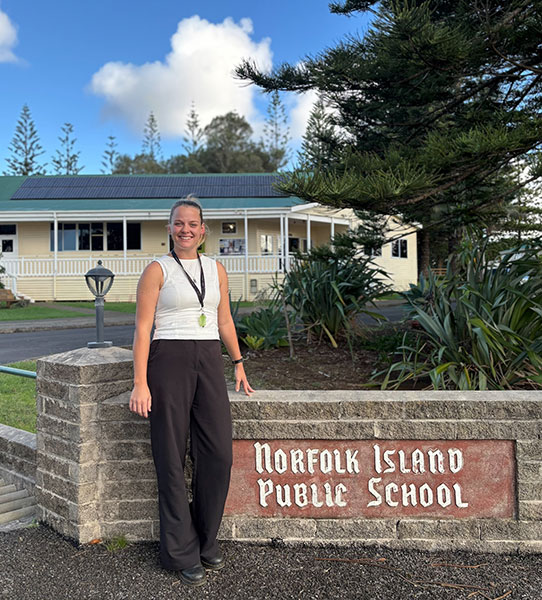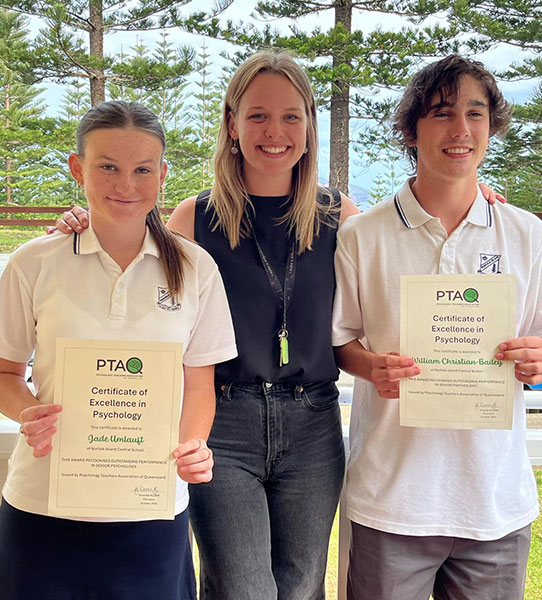
The remote territory of Norfolk Island is usually known for its natural resources, like unspoilt beaches and bountiful marine life. But for Kirstin Ellard, Science Teacher at Norfolk Island Central School, her time on the island has shown the most valuable resource is her community.
The population of Norfolk Island is a touch over 2,000, and being a close-knit community has many benefits.
Kirstin says when she teaches her students about anatomy and organ systems, she just picks up the phone and calls the local abattoir.
"I just call, 'Speed' from Speed’s Meats—yes, that is his name—and he’ll prepare me some eyeballs or a 'pluck', which is a set of lungs attached to a heart, with the oesophagus and windpipe still intact," Kirstin says.
'And then the kids are all looking at what real organs look like.'
In addition to her (somewhat unusual) connection with Speed, Kirstin has forged a working relationship with the Norfolk Island National Park rangers.
This has resulted in the development of a specialised science program for her Prep through to Year 6 students.
'Since 2023, we have been taking the students into a different part of the National Park, and they have a science lesson that aligns with the curriculum,' Kirstin says.
'This is a passion project for me—using this environment to teach science outside of the classroom.'
Norfolk Island is home to a variety of flora and fauna, including iconic bird species like the green parrot and morepork owl. Kirstin encourages her Prep students to spot endemic birds, not just by sight, but by tuning into the sounds, smells, and sensations of their surroundings, expanding their understanding of what it means to observe.
'We get them to feel different plants and stop and listen to see if they can hear any birds,' Kirstin says.
"We actually have fish that drop in the National Park from the birds that fly over, and we ask them, 'How did the fish get in the middle of the National Park?' My community is really helping me teach and it's getting better and better all the time because after being here for seven years I know most people on the island."
Norfolk Island Central School Principal, Tom Black, says Kirsten’s community interactive approach has transformed student learning.
'Establishing the relationship with National Parks allows our students to learn outside in a unique context and promotes the island’s focus on sustainability, protecting the pristine place we call home,' Tom says.
'Kirsten is an outstanding educator who commits tireless energy into improving her students’ learning experience.'
Teaching through experiences

Kirstin with students Liam and Jade.
Kirstin’s passion for science is so strong that she’s been known to pull over the school’s commuter van—full of students—just to check out an interesting rock formation.
'I like to create experiences where the kids can actually engage,' she says.
"For example, there are huge pieces of sandstone tilted on their side near our main beach—the kids drive past them all the time, but they never think about them. So, I just thought, 'Let’s stop and have a look at this'."
'I asked them to explain how this huge piece of sandstone got tilted on its side.'
'I love to give them a reason to stop and think—to use the evidence and talk about how Norfolk was formed and that, even though it happened millions of years ago, there were lots of eruptions that created this island and we can use the rock formations to support that theory.'
'Science is all about understanding the world around us, so let's use the world around us to make observations and look at evidence. It's so amazing here.'
At Norfolk Island Central School, teachers often lead specialist subjects independently, which can mean fewer day-to-day opportunities to connect with colleagues in the same field.
Kirstin says this has challenged her to find ways to grow as an educator, including tapping into the expertise of visiting academics.
'When they come to the island, we involve them in our classes and use the opportunity to exchange ideas,' she says.
'You can feel a bit disconnected here, so you've got to stay current and on top of emerging practices proactively.'
Parents love her too
Norfolk Island parent Kylie Umlauft couldn’t be more grateful that Kirstin brought her passion and talent to their small island community.
'We are incredibly fortunate to have Ms Ellard teach our children,' Kylie says.
'Ms Ellard looks beyond the syllabus, bringing learning to life and leaving a lasting impact on her students and their families,' she says.
Kirstin realised quite soon after she arrived in 2018 that the island’s remoteness also challenges her students.
She saw they needed a way to explore their post-school options first-hand, so she initiated the island’s first trip to Australia for seniors to experience tertiary education options, which has now become an annual event.
'Students visit universities and TAFE, do taster courses and experience theatre for the first time,' she says.
'We do workshops at a medical science lab where we pull apart DNA or analyse blood. This year we’re also taking them to the Careers Expo, plus they get to order Uber Eats!'
'Many come back from the experience and know exactly what they want to do—it’s very special.'
Stephanie Williams was one of the Norfolk Island students who took the life-changing trip to Australia in 2024. She’s now thriving as a first-year Psychology student at the University of the Sunshine Coast, but just a few years ago, she wasn’t sure she’d even finish school.
'When I started Year 12, I was really struggling with anxiety and depression,' Steph says.
'Ms Ellard put so much extra work into each Psych lesson to ensure it was engaging and understandable, it made me fall back in love with learning and psychology.'
Now averaging 90% in most of her university classes, Steph still remembers what she learned in those high school lessons and how Ms Ellard always prioritised student wellbeing.
'Ms Ellard always reinforced the need to prioritise our wellbeing over academic performance, which personally got me through the year being a perfectionist,' she says.
'Every person in our class said Psychology was their favourite subject.'
Part of the community
Reflecting on what drew her to the role on Norfolk Island, Kirstin says it was the rare chance to grow her teaching career while embracing a unique island lifestyle.
'We were trying to find a place where I could teach and still do all the other things I loved, like snorkeling, and my husband could do lots of spear fishing,' she says.
And while the reasons for moving to Norfolk Island are still just as strong, she now says the key attraction for her and her family is the community.
'It's just such an awesome place to live and raise a family,' she says.
'I'm also so lucky as a science teacher—what other environment would you want to teach science in?'
'We're building a house now, which will be our forever home.'